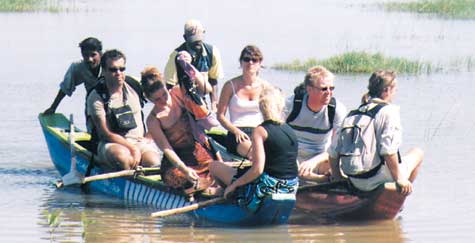| Plus |
|
|||
|
Making waves
in Pottuvil Lagoon During the two-hour ecotour of Pottuvil Lagoon we saw more than 25 species of birds and once Samsudeen brought the canoe alongside a two-metre long water monitor swimming across the lagoon. Besides the abundant bird life, assorted reptiles, grey langurs and the occasional elephant are found in the Pottuvil Lagoon, which is now home to the first community managed ecotour in Sri Lanka. The Pottuvil Lagoon Ecotour is organized by the Hidiyapuram Fisheries Cooperative Society, a government supported community based organization (CBO), in collaboration with the Arugam Bay Hillton, a family run guesthouse in Arugam Bay (www.arugambay.lk). The society's members, local fishermen such as Samsudeen, the society's president, have taken on the role of part-time 'ecotour guides', using canoes owned by the society. The Arugam Bay Hillton acts as the booking centre; its location convenient for tourists staying in Arugam Bay. A local three-wheeler driver organizes travel to and from the lagoon. The Pottuvil Lagoon Ecotour is owned and operated by members of the local community. Local ownership ensures that the revenue generated by the ecotour (Rs. 1,200 per ecotour for two people), stays in the community. After deducting the cost of salaries for the ecotour guides, booking charges and transport, the society is left with more than 50% of the ecotour fee, which is paid into the society's bank account. Sri Lanka has a large potential for attracting 'high value' ecotourists. If this potential is mismanaged, the natural resources upon which such ecotourism depends will quickly be degraded and destroyed. The approach to promoting ecotourism in Pottuvil Lagoon should be of interest to government departments, donors, local tour operators and others engaged in the business. In Pottuvil, the financial benefits from the ecotour are already making an impact on local attitudes towards the management of natural resources in Pottuvil Lagoon. The future success of the ecotour will ultimately depend on effective local management of the lagoon's natural resources. Two examples of this: Much of the mangrove forest fringing Pottuvil Lagoon was destroyed during the past two decades. As mangroves are the ecological basis of the lagoon's rich biodiversity it is important to protect them. The society's members, well aware of this, have demarcated the boundary of the mangroves in collaboration with the District Forest Officer in Ampara, Mr. Suhood. The society produces mangrove saplings in its nursery, to help it regenerate in areas where it has been destroyed. The nursery is managed by one of the society's members, whose salary is paid from the revenue generated from the ecotour. The society is also trying to protect the lagoon's wildlife. The shooting of water birds, such as spot-billed pelican and painted stork for food and for 'sport', is a problem in Pottuvil Lagoon. With the support of the Pottuvil Police Post OIC A. A. Wahid, the society has raised the profile of this issue locally. They have erected signs warning that shooting birds in the lagoon is prohibited. These examples
highlight the issues that need to be overcome if the promotion of
community-based ecotourism in Sri Lanka is to become widespread
and long-term. For these initiatives to be successful resource-users must also be actively supported to develop sufficient institutional capacity to enable them to cooperate effectively with representatives of government departments. The authorities must relinquish some of their power to empower local communities to play a greater role in local environmental management. The Pottuvil Lagoon Ecotour shows that if local people benefit financially from the environment in which they live, they will become its most effective guardians. |
||||
Copyright © 2001 Wijeya Newspapers
Ltd. All rights reserved. |
